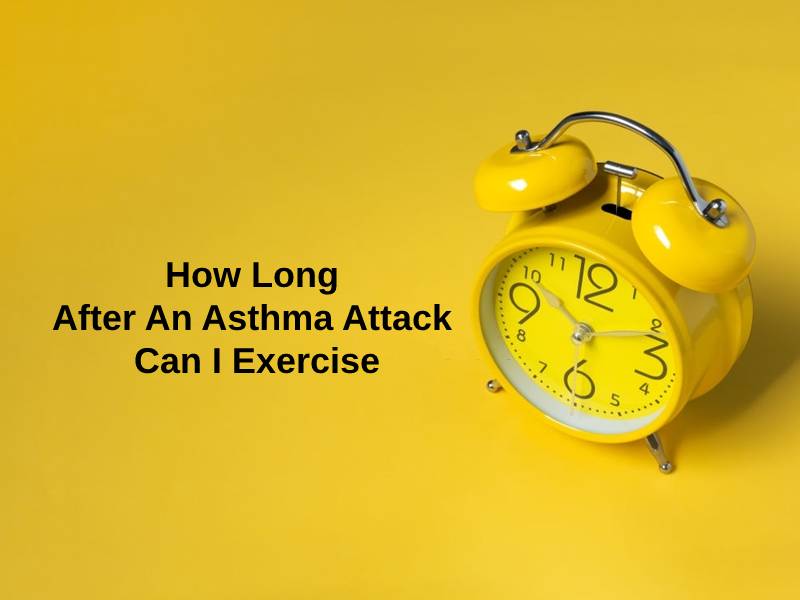Exact Answer: At least 24 – 48 hours
Asthma is a pulmonary condition that results in breathing difficulties, wheezing, and coughing. For people with asthma, their airways become narrow and swell up. In addition, this produces an increased amount of mucus, which makes breathing hard.
Unfortunately, asthma cannot be completely cured, and people with asthma may even have recurring asthma attacks that are dangerous. But it is important to track your symptoms and any change that occurs, by consulting with a doctor, who can help keep your condition in check. Keep in mind that the symptoms of asthma can be controlled, using various techniques, and exercise is one of them.

How Long After An Asthma Attack Can I Exercise?
| Severity of asthma attack | Waiting time for exercise after asthma attack |
| Mild to moderate asthma attack | Approximately 24 – 48 hours |
| Severe asthma attack | May take days |
During an asthma attack, your regular asthma symptoms suddenly worsen. Symptoms include severe and sudden wheezing, unstoppable coughing, rapid breathing, chest tightness, and pain, shortness of breath, tightened muscles, difficulty in talking, anxiety, and panic, blue lips, and fingernails, pale and sweaty face, and symptoms that get worse despite using medication.
For mild to moderate asthma attacks, it can up to 24 to 28 hours after the attack, to start exercising again.
In the case of a severe asthma attack, it may take several days or even weeks, as it depends on the time that the body takes to recover from the asthma attack.
There are many types of asthma, including allergy-induced asthma, occupational asthma, exercise-induced asthma, and more.
Allergy-induced asthma is triggered by particles like pollen, mold spores, skin particles, dried pet saliva, cockroach excrement, that are airborne.
Occupational asthma is triggered by chemical fumes, dust, gases, and other irritants that are commonly found in the workplace setting.

Exercise-induced asthma is triggered by exercise and physical activity, as a result of breathing in dry and cold air that triggers the contraction of muscles around your airways.
Each of these types of asthma can vary in severity, and therefore vary in the recovery time. Some may take a few hours, and many may take a few days before you can engage in any sort of activity again. This is why it is advised to wait for a particular duration after an asthma attack before you can exercise or be a part of any fitness-related activity.
Why Does It Take That Long To Exercise After An Asthma Attack?
Asthma attacks are the result of bronchospasm, which is the tightening of the muscles surrounding the airways. Then the lining of the airways swells up and becomes inflamed. Then, the mucus in the airways becomes thicker and is produced in larger amounts. As a result of the excess thick mucus, you are subjected to breathing difficulties, as less oxygen is able to reach the lungs.
As a part of your asthma action plan, if you do happen to have an asthma attack, it is important to always keep your inhaler with you at all times as this can help you when you are suffering. As soon as you recognize your suddenly worsening symptoms, you may use the inhaler to relieve you from an asthma attack.
Despite using the medication, if your symptoms aren’t subsiding, then it is of utmost importance that you reach out for emergency medical assistance.
If you have a mild asthma attack, then you are advised to wait for at least 24 to 48 hours after the attack, to start exercising.
If you have a severe asthma attack, then you are advised to wait for at least a few days, or weeks, before exercising. It ultimately depends on when your body recovers, and when your symptoms have subsided.

During exercise, people breathe in through their mouths. This means that they are breathing in drier and colder air. Sometimes, the muscles surrounding the airways contract suddenly and make the airways narrow, because they are sensitive to changes in humidity and temperature. This triggers an asthma attack and is known as exercise-induced asthma.
Therefore, this waiting time is advised because physical activity can sometimes make your symptoms worse. While it can be helpful for regulating asthma, it can also be a risk.
Conclusion
Essentially, you must rest for as long as your body needs to recuperate. But, as a general rule of thumb, you may exercise after 24 – 48 hours of having an asthma attack. This waiting duration may increase if the asthma attack is severe and did a lot of damage.
The most important thing to do is look out for even the smallest symptoms that you may feel. This may be anything from chest tightness to coughing and wheezing. After noticing your symptoms, it is advised to fix an appointment with your doctor and consult them regarding your treatment. Accordingly, as time passes, your treatment will also change with respect to your symptoms.